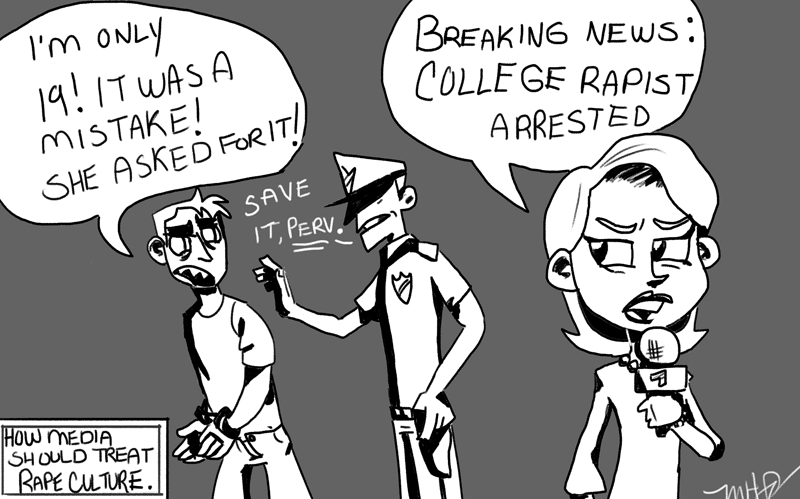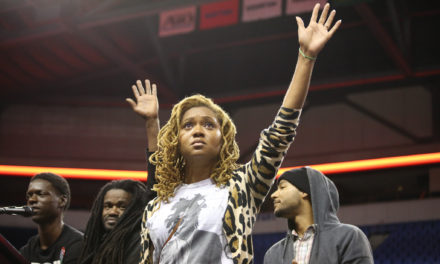We need to change how we talk about sexual violence. Earlier this year, CNN covered the Steubenville case which focused on convicted rapists, telling the story of high-achieving students who were also football stars who made a drunken mistake. The coverage stressed their vulnerability and loss of promising futures.
A recent example of this kind of reporting in our community is the incident at Georgia Tech: the “rape-bait email.” Matthew, the Social Chair of Phi Kappa Tau, wrote an extensive email to his frat brothers about how to lure women at parties, debilitate their judgment with alcohol and have sex with them. This was leaked on the website Total Frat Move (TFM) and was immediately picked up by local and national media.
The sweeping media message portrayed the email as a horribly ill-conceived incident; there was a lot of coverage on his apology letter, pushing the idea that it that shouldn’t construct our impression of Matthew or Georgia Tech. These reports only tell part of the story. Time and time again sexual violence is portrayed as an isolated incident, mistakes made by misguided youth. We need to change this conversation and talk about the underlying issues. We need to talk about rape culture.
We have to be forthcoming in our talk about sexual violence, in that it is a product of patriarchy, racism and other unequal power structures. Sexual assault is not only just a behavioral error, it is a reflection of social dynamics in our society.
The email written by Matthew was not merely a “mistake” and we need to stop framing it as such. Doing so makes it seem that an apology letter and some social sanction is going to fix the problem. Yes, I’m sure that Matthew is a complex person with lots of good qualities and I’m sure that he has learned a lot from this incident. But to limit the conversation to that is an injustice. Matthew did not mistakenly write an email on how to get women drunk and non-consensually have sex with them. Every idea that was put forth comprises concepts Matthew has learned from years of living in our violent and sexist culture.
I wonder how many rape jokes Matthew has heard in his life? I wonder how movies he has seen where men unabashedly took advantage of women under the influence of alcohol? I wonder how many magazine articles Matthew has read that put male sexual gratification as the top priority in sexual encounters? Surely Matthew learned ideas he wrote in the email from the dominant societal narratives about sex and alcohol. Toxic messages that we are inundated with everyday have normalized sexual violence in our culture. To truly address this issue we need to examine and change the systemic structures that made the production of that email possible.
Unlearning is hard. A lot needs to be done to effectively combat sexual violence and conscientious public discourse is the first step. People who have written, re-posted or hash-tagged articles about the incident are not embracing an idea of intellectual or cultural superiority, they are trying to start a conversation about what is causing and perpetuating violence. Another crucial part of fighting rape culture is media reporting that doesn’t perpetuate victim-blaming.
Last week, Daisy Coleman from Missouri very bravely told her horrifying story about how she was raped at 14 and details how peers, adults and the media blamed her for her rape. During a Fox News segment on the case, criminal defense attorney Joseph DiBenedetto accused Daisy of making false rape accusations and said that she should have “expected” to be taken advantage of since she had been drinking.
Irresponsible media coverage is making it unsafe for survivors of violence to come forward. One in four college women has survived rape or attempted rape but the majority of these incidents remain unreported. How we treat survivors and how we talk about sexual violence has a huge role to play in this. I am done with the media subtly and explicitly shifting the blame of sexual assault from perpetrators to survivors. I am done with rape and sexual violence being portrayed as mistakes. I am done with rape culture.
Nowmee Shehab is a College sophomore from Dhaka, Bangladesh.
If you or someone you know has been affected by sexual violence, you have support at Emory. Please contact Lauren (LB) Bernstein, Assistant Director for the Respect Program at 404.727.1514 or respect@emory.edu for confidential support. You can also learn more about the Respect Program at respect.emory.edu.
Illustration by Mariana Hernandez
The Emory Wheel was founded in 1919 and is currently the only independent, student-run newspaper of Emory University. The Wheel publishes weekly on Wednesdays during the academic year, except during University holidays and scheduled publication intermissions.
The Wheel is financially and editorially independent from the University. All of its content is generated by the Wheel’s more than 100 student staff members and contributing writers, and its printing costs are covered by profits from self-generated advertising sales.






excellent piece!
finally some coverage of the GA tech incident that is not atrocious
“Every idea that was put forth comprises concepts Matthew has learned from years of living in our violent and sexist culture.” Very productive way to think about it. Props for writing
Hi, I’ve paid for 2 months of letters and have not received any yet. How do I get that fixed?thanks